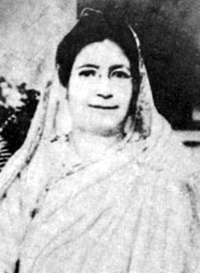Mapping female emancipation
autonomous womanhood vs. dasi
By rahnuma ahmed
His comments made me stop in my tracks, I began re-thinking why I had proceeded as I had. I’d suffered nagging doubts about Part II after it had been published. May be, the discussion had been too academic, may be it had turned some readers off.
My brother, the one in London, had e-mailed me, saying among other things, ‘[I look for] what can you tell me that reveals a little more about the relationship [she] had with [her] work…[I read, to discover what], as people say, delivers that one ‘a-ha’ moment.
As I began working on Part II, I remembered something which I’d been told long ago by a faculty member at Sussex university just before her seminar began. ‘Oh, 90% of my presentation will be a preamble.’ ‘Preamble? You mean as in the constitution…?’ ‘Yes,’ she chuckled. ‘It’ll be about the purpose of my study, it’s philosophical underpinnings, how I steer and navigate myself through what has been written thus far on the subject…where I situate my own efforts.’
May be I could re-direct Saif’s comments toward myself, I thought, my relationship with this business of re-reading. It would help recap what I’d written in Part II. It would also help readers see where I situate my own efforts.

Re-reading Begum Rokeya for me, has involved taking stock of what has been written about her. Of critically thinking through what sense we have made of her life and struggles, her achievements, what we think she was up against and why. It has meant engaging with some thorny issues in feminist theory. And of course, it has inolved returning to Rokeya Rachanavali (1984), again and again. Continue reading “RE-READING BEGUM ROKEYA ? CONCLUDING PART”
